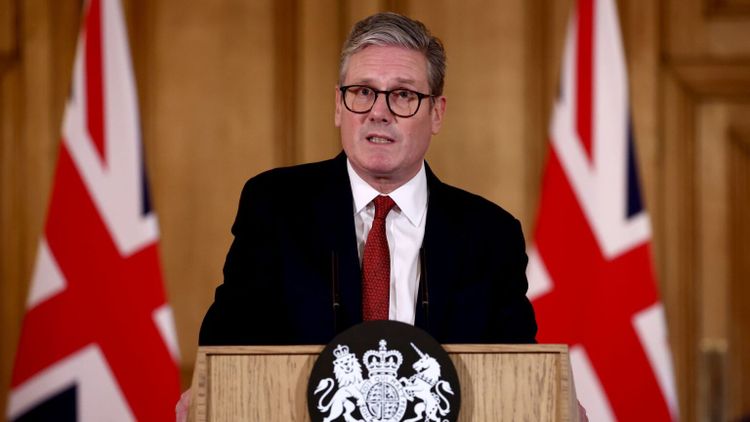Keir Starmer’s two-tier tyranny

After the violent outbreaks, there is now increased enforcement. UK Prime Minister Keir Starmer spoke to the country from Downing Street last night. He discussed the recent violence, protests, and conflicts in Southport, Hartlepool, and London. These events were triggered by the alleged murders of three young girls by a 17-year-old in Southport earlier this week. Starmer announced a series of actions to address the disturbing incidents that have been widely televised and shared on smartphones this week, including an assault on a mosque in Southport on Tuesday.
Even though he didn't provide many specifics, Starmer advocated for the use of criminal behaviour orders to limit the movements of known troublemakers and for the widespread implementation of facial recognition technology by police forces, disregarding concerns about civil liberties. He also urged social media companies to take greater action against 'misinformation', which could be seen as a disguised request for censorship.
It is clear that the current acts of rioting are disgraceful. The spread of false information online by extreme right-wing figures about the Southport suspect being a Muslim individual who arrived in a small boat was also reprehensible. It has since been revealed that he is actually a British citizen with roots in Rwanda and no apparent connections to Islam. However, we must not let the actions of a small minority tarnish the freedom of speech for everyone.
Starmer was not clear in expressing his desires for social media companies, stating that there needs to be a balance when it comes to content moderation. It's likely that he was targeting Elon Musk's X specifically, as it is one of the few platforms that supports free speech by reinstating the account of Tommy Robinson, an anti-Islam activist, last November.
But the trend is unmistakable. Following Labour's decision to repeal the Higher Education (Freedom of Speech) Act - one of the few successful laws passed by the Tories - it is evident that this government values our basic freedoms even less than its predecessor, which attempted to safeguard free speech on college campuses while threatening it with the Online Safety Act.
Despite the Tories not being good with protecting free speech and civil liberties, things are expected to worsen. Starmer is a type of politician who views dissent as risky and believes citizens should be controlled and supervised. It is likely that we will see more authoritarianism disguised as liberalism from this individual who has experience as a barrister, chief prosecutor, and technocrat. It is a fundamental part of his character.
This critical campaign will extend beyond the extreme right-wing group he is currently targeting. Labour's plan promises to strengthen laws against hate crimes involving 'gender,' which could lead to restrictions on individuals' freedom to identify men and women. Starmer has supported press regulation for a long time, and during his time as head of the Crown Prosecution Service, he oversaw numerous unjust prosecutions of journalists following the phone-hacking scandal.
At the same time, I believe we all are aware of who will benefit from Starmer's crackdowns - or at least who will face lighter consequences. He could have addressed the public after the Harehills riot, where police were assaulted and a bus was set on fire by a group of people after social workers tried to take some Roma children into custody. However, he chose not to. Instead, we received a brief statement at that time. "Regardless of the reason or motivation, we do not differentiate. Crime is crime," Starmer stated in Downing Street last night. If that were the case, one would expect him to mention the other major riot that occurred just two weeks ago.
The way in which violent disorder is dealt with differently depending on the situation seems to be becoming more established. In the Harehills riot, the West Yorkshire Police chose to step back, leaving residents feeling scared in their own homes. It is possible that the police were worried about escalating tensions within the community, even though the situation was already chaotic. On the other hand, over 100 individuals were arrested in central London after a protest on Whitehall turned into a violent clash involving troublemakers and the police. This has led some to question whether the police only intervene when it involves white working-class men causing trouble. These inconsistencies have caused public outrage and given ammunition to far-right extremists to portray themselves as victims.
It was also fascinating to hear Starmer speak with so much emotion to criticize hateful activism last night. Interestingly, he has not spoken out against the 'pro-Palestine' protests in London that have sometimes turned into displays of anti-Semitism. The fact that some of the groups behind these demonstrations have ties to Hamas, a violent terrorist organization, makes his silence even more troubling. The Muslim Association of Britain, for example, was established by a former Hamas leader. However, it is important to note that these demonstrations should not be labeled as 'hate marches'...
In order to address the troubling events of this week, it is important to support freedom of expression, fair law enforcement, and individual rights. These principles will allow us to have open discussions about recent issues, refute false claims made by troublemakers, and prevent further division within our community. We must oppose Starmer's divisive measures.
Tom Slater is the person in charge of spiked's writings. You can find him on X by searching @Tom_Slater_
If you want to publish spiked's content, respond to something, or fix an error, please get in touch with Viv Regan, the managing editor.









































